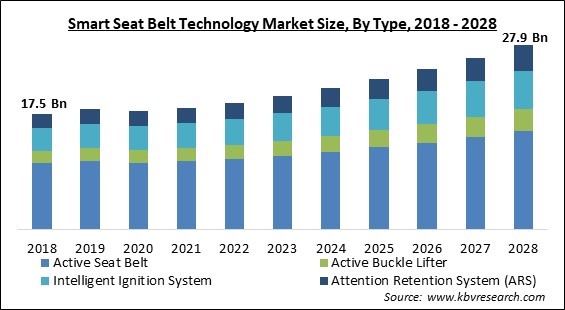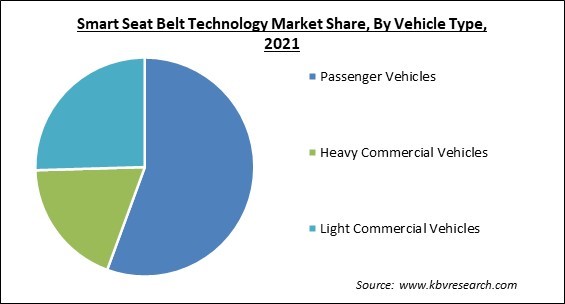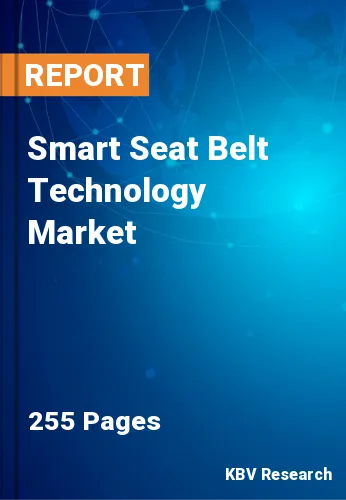The Global Smart Seat Belt Technology Market size is expected to reach $27.9 billion by 2028, rising at a market growth of 6.5% CAGR during the forecast period.
Smart seat belts are seat belts equipped with modern technologies that work to improve an automobile's safety features. Smart seat belts are now being introduced that automatically tighten before an accident, reducing the chance of damage. For example, ZF Friedrichshafen AG created the Active Control Retractor (ACR) technology, which informs the driver via the seat belt's vibration if the car drifts out of its lane or approaches another car too closely.

Several aspects including rising consumer awareness of car safety and a rise in traffic accidents are expected to spur market expansion for smart seat belt technology. Additionally, the sector for smart seat belt technology is anticipated to benefit from a rise in automobile safety standards and increased vehicle production in emerging nations in the near future.
If nations' manufacturing and production standards were to adhere to a number of UN vehicle safety criteria, many lives may be saved. They demand that manufactures ensure that almost all vehicles have seat belts and airbags. Road accidents considerably raise the danger of internal and external injuries if these fundamental prerequisites are not met. On the other hand, rising consumer disposable income is boosting demand for luxury automobile sales, which are characterized by enhanced safety measures as standard equipment. This factor is hastening market development as well. Due to the rising public awareness of the need of driving safely, there is a growing demand for seatbelts, which has contributed to the market's expansion.
Due to the disruptions caused by the pandemic in the automotive, transportation, and tourist industries, automotive component manufacturers have adjusted their operations in response to the coronavirus pandemic. As a result of the COVID-19 pandemic's disruption of supply chains and manufacturing schedules, automobile production and sales suffered substantially, which had a detrimental influence on the market for smart seat belt technology in 2020. Smart seat belt sales are intricately related to the worldwide automobile production and sales industries. If the worldwide lockdowns are prolonged, output losses would likely increase.
Globally, road accidents are a major worry, particularly while travelling on highways with heavy traffic and poor weather conditions. As per the World Health Organization, 1.25 million individuals die each year in traffic accidents worldwide. In recent years, customers' lifestyles have gotten increasingly chaotic, with negative driving practices such as web browsing, texting, and talking on the phone when driving resulting in automobile accidents.
Despite the fast expansion of the automobile industry as a result of its major benefits and improvements, the rising danger of road accidents for riders sometimes serves as a factor restricting vehicle usage. Every year, millions of drivers are involved in accidents in the United States. As per the data released by the National Highway Traffic Safety Administration (NHTSA), in 2019 there were a cumulative of 6,756,000 police-reported motor vehicle traffic collisions.
The high cost of implementing safety applications in automobiles is anticipated to restrain the growth of the smart seat belt technology market, as it raises the price of the vehicle. The expense of installing sensors linked with smart seat belt technology contributes to the increased price of automobiles. Additionally, smart seat belts give additional functions like as buckle lift, pretension, and better safety compared to traditional seat belts; nevertheless, their price is significantly higher than that of passive seat belts.

Based on type, the smart seat belt technology market is classified into Active Buckle Lifter, Active Seat Belt, Intelligent Ignition System, and Attention Retention System (ARS). Active Buckle Lifter segment recorded a significant revenue share in the smart seat belt technology market in 2021. Active Buckle Lifter is an example of a relatively little innovation that enhances convenience and safety. The vertical movement of the seat belt buckle is accomplished by an electric motor.
Based on propulsion, the smart seat belt technology market is fragmented into ICE, Electric & Hybrid, and Alternate fuel Vehicle. ICE segment registered the maximum revenue share in the smart seat belt technology market in 2021. This is due to the expansion of the automobile sector in emerging nations. The Indian government, for example, has required that all local automakers produce flex-fuel engines. The gasoline in an internal combustion engine (ICE) is ignited and consumed within the engine itself.
On the basis of sales channel, the smart seat belt technology market is bifurcated into Original Equipment Manufacturer and Aftermarket. The OEM segment procured a significant revenue share in the smart seat belt technology market in 2021. Owing to the growing emphasis on passenger safety, there has been a substantial rise in the production of technologies that might lower the number of deaths resulting from automotive accidents. Original equipment manufacturers have reinvented a number of security-related technologies to make their products more dependable.
By vehicle type, the smart seat belt technology market is segmented into passenger vehicles, light commercial vehicle, and heavy commercial vehicles. The passenger vehicles segment garnered the maximum revenue share in the smart seat belt technology market in 2021. In developing economies, the number of passenger vehicles is increasing at a considerable rate. This is due to improved lifestyles, higher consumer spending power, and the expansion of infrastructure. Airbags and seatbelts are mandatory equipment in passenger automobiles in the majority of nations in order to avoid fatalities caused by accidents.
| Report Attribute | Details |
|---|---|
| Market size value in 2021 | USD 18.4 Billion |
| Market size forecast in 2028 | USD 27.9 Billion |
| Base Year | 2021 |
| Historical Period | 2018 to 2020 |
| Forecast Period | 2022 to 2028 |
| Revenue Growth Rate | CAGR of 6.5% from 2022 to 2028 |
| Number of Pages | 255 |
| Number of Tables | 440 |
| Report coverage | Market Trends, Revenue Estimation and Forecast, Segmentation Analysis, Regional and Country Breakdown, Companies Strategic Developments, Company Profiling |
| Segments covered | Type, Propulsion, Sales Channel, Vehicle Type, Region |
| Country scope | US, Canada, Mexico, Germany, UK, France, Russia, Spain, Italy, China, Japan, India, South Korea, Singapore, Malaysia, Brazil, Argentina, UAE, Saudi Arabia, South Africa, Nigeria |
| Growth Drivers |
|
| Restraints |
|
Region-wise, the smart seat belt technology market is analyzed across North America, Europe, Asia Pacific and LAMEA. Asia Pacific acquired a promising revenue share in the smart seat belt technology market in 2021. This expansion is attributable to the well-established car sector in developing nations such as China and India. In addition, the rising investments of market leaders and their strategic partnerships are anticipated to contribute to the market expansion in the region during the forecast period. Given the region's rising population, Asia's economy and industries are in a constant state of flux.
Free Valuable Insights: Global Smart Seat Belt Technology Market size to reach USD 27.9 Billion by 2028
The market research report covers the analysis of key stake holders of the market. Key companies profiled in the report include Autoliv, Inc., Continental AG, Denso Corporation, Tokai Rika Co., Ltd., ZF Friedrichshafen AG, Hyundai Mobis Co., Ltd., GWR Safety Systems, ITW Automotive Products GmbH, Joyson Safety Systems Aschaffenburg GmbH, Yanfeng International Automotive Technology Co. Ltd.
By Type
By Propulsion
By Sales Channel
By Vehicle Type
By Geography
The global Smart Seat Belt Technology Market size is expected to reach $27.9 billion by 2028.
Rise in the Awareness among Consumers toward Automotive Safety are driving the market in coming years, however, High Initial Cost and Complex Structure restraints the growth of the market.
Autoliv, Inc., Continental AG, Denso Corporation, Tokai Rika Co., Ltd., ZF Friedrichshafen AG, Hyundai Mobis Co., Ltd., GWR Safety Systems, ITW Automotive Products GmbH, Joyson Safety Systems Aschaffenburg GmbH, Yanfeng International Automotive Technology Co. Ltd.
The Aftermarket market acquired maximum revenue in Global Smart Seat Belt Technology Market by Sales Channel in 2021; thereby, achieving a market value of $16.2 billion by 2028.
The Active Seat Belt market is leading the Global Smart Seat Belt Technology Market by Type in 2021; thereby, achieving a market value of $14.9 billion by 2028.
The Europe market dominated the Global Smart Seat Belt Technology Market by Region in 2021; thereby, achieving a market value of $9.4 billion by 2028.
Our team of dedicated experts can provide you with attractive expansion opportunities for your business.

